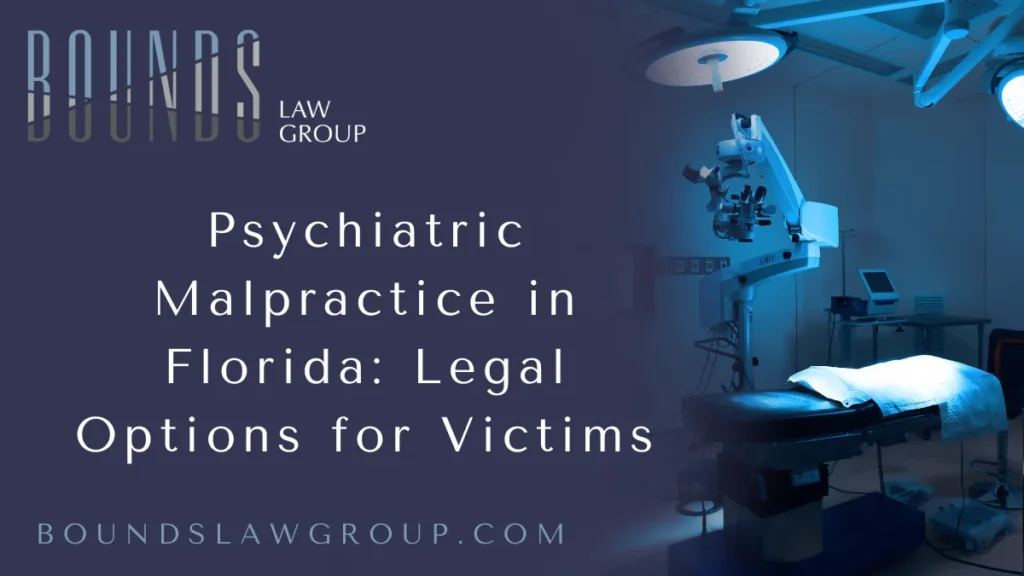
When mental health professionals fail to uphold the standard of care expected in their field, the consequences can be devastating. At Bounds Law Group, our experienced Florida psychiatric malpractice lawyers are committed to helping victims of psychiatric negligence obtain the justice and compensation they deserve.
Contact us today through our free case evaluation form or call 877-644-5122.
What Is Psychiatric Malpractice?
Psychiatric malpractice occurs when a mental health professional—such as a psychiatrist, psychologist, therapist, or counselor—acts negligently, causing harm to a patient. This negligence can arise from a failure to diagnose a condition, improper treatment, overmedication, failure to prevent suicide, or even inappropriate personal relationships with patients.
In Florida, proving psychiatric malpractice requires demonstrating:
- A duty of care existed between the professional and the patient.
- There was a breach of the standard of care.
- The breach directly caused physical, emotional, or financial harm.
- Documented damages resulted from the malpractice.
If you or a loved one have suffered due to negligent psychiatric care, a Florida psychiatric malpractice lawyer from Bounds Law Group is ready to help you navigate the complexities of your legal options.

Types of Psychiatric Malpractice in Florida
The field of psychiatry is sensitive and often involves deeply vulnerable patients. Any deviation from ethical and professional conduct can lead to catastrophic consequences. Common forms of psychiatric malpractice we see include:
1. Failure to Diagnose or Misdiagnosis
Failing to properly identify psychiatric disorders like bipolar disorder, schizophrenia, PTSD, or severe depression can delay necessary treatment and put patients at risk of self-harm, suicide, or violent behavior.
2. Improper Medication or Overmedication
Psychiatrists often prescribe powerful drugs with serious side effects. Prescribing the wrong medication, administering the wrong dosage, or ignoring drug interactions can lead to seizures, heart complications, cognitive impairments, and death.
3. Inappropriate Sexual Relationships
Therapists and psychiatrists are in positions of significant authority. Any sexual relationship with a patient is considered a serious ethical violation and may qualify as malpractice under Florida law.
4. Failure to Prevent Suicide
Psychiatrists have a duty to assess suicide risk and intervene appropriately. Failing to hospitalize a suicidal patient or disregarding warning signs can be grounds for legal action if a suicide or suicide attempt occurs.
5. Breach of Confidentiality
Releasing or misusing a patient's sensitive information without consent can severely harm their mental health, career, or personal life—and it’s a violation of both ethical standards and Florida law.
Your Legal Rights as a Victim
Victims of psychiatric malpractice often feel overwhelmed and unsure about how to proceed. It’s critical to understand that Florida law allows injured patients to seek financial recovery for:
- Medical bills
- Therapy costs
- Pain and suffering
- Lost wages or earning capacity
- Wrongful death damages, in fatal cases
A skilled Florida psychiatric malpractice lawyer from Bounds Law Group will thoroughly investigate your case, gather expert testimony, and aggressively advocate for your rights in or out of court.
How to Prove Psychiatric Malpractice in Florida
Proving psychiatric malpractice in Florida requires a detailed, methodical approach, as it involves both legal and medical complexities. In these types of cases, the burden of proof lies with the plaintiff, meaning the victim must provide clear evidence that the mental health professional's negligence directly caused harm. Below are the critical steps involved in proving psychiatric malpractice:
1. Establishing the Standard of Care
The first step in proving psychiatric malpractice is to establish the standard of care. In any medical malpractice case, the plaintiff must show that the mental health professional failed to meet the accepted standard of care in their field. This standard is often determined by expert testimony from other psychiatric professionals who can speak to what is generally accepted as appropriate treatment in the field.
For example, if a psychiatrist fails to assess a patient for suicidal ideation and the patient subsequently attempts suicide, an expert in psychiatry would testify that a reasonable psychiatrist would have recognized the signs of suicidal tendencies and intervened appropriately.
2. Breach of Duty
Once the standard of care is established, the next step is demonstrating that the mental health professional breached this duty. This can include situations such as:
- Failure to diagnose: A psychiatrist misdiagnoses a condition, leading to improper treatment.
- Inappropriate treatment: Prescribing the wrong medication or therapy methods that lead to harm.
- Failure to intervene: Not taking the necessary steps to prevent harm, such as not admitting a suicidal patient for inpatient care.
A Florida psychiatric malpractice lawyer will work with expert witnesses to establish that the defendant's actions (or lack of action) deviated from accepted professional standards.
3. Causation
It’s not enough to show that the psychiatrist breached the standard of care; the plaintiff must also prove that this breach directly caused harm. This is often the most challenging element to prove. In psychiatric malpractice cases, causation is typically demonstrated by showing that:
- The patient's condition worsened due to the error.
- The patient’s symptoms became more severe or led to further psychological damage.
- The malpractice directly contributed to additional mental health crises, self-harm, or even death.
Expert testimony is critical in establishing causation. For instance, a mental health expert may explain how failing to diagnose a condition properly led to unnecessary suffering and emotional damage.
4. Proving Damages
Finally, the plaintiff must prove that damages occurred as a result of the malpractice. In psychiatric malpractice cases, damages can be both economic and non-economic:
- Economic damages may include medical bills, therapy costs, lost wages, or other out-of-pocket expenses.
- Non-economic damages might involve pain and suffering, emotional distress, loss of quality of life, or in severe cases, the wrongful death of a loved one.
Documenting these damages is essential for securing appropriate compensation. This can be done through medical records, therapy logs, witness statements, and personal testimony.

Why You Need a Florida Psychiatric Malpractice Lawyer
Medical malpractice laws in Florida are complex, especially when it comes to mental health. Psychiatric malpractice claims require an in-depth understanding of:
- Florida’s pre-suit requirements
- Expert witness affidavits
- Statute of limitations (typically two years)
- Complex psychological and medical evidence
At Bounds Law Group, we specialize in handling these difficult cases. We work with top medical experts and forensic professionals to build ironclad cases for our clients. We understand how to counter the tactics used by hospitals, mental health institutions, and malpractice insurers to deny your claim.
Speak to a Florida Psychiatric Malpractice Lawyer Today
At Bounds Law Group, we are dedicated to holding negligent mental health professionals accountable. Our mission is to help victims regain control of their lives and recover the financial support they need for long-term healing.
Complete our free case evaluation form and speak directly with an experienced Florida psychiatric malpractice lawyer. You can also call us now at 877-644-5122 for immediate assistance.
Your mental health matters. Your rights matter. Let us fight for you.
Helpful Resources and References
- Florida Department of Health – Practitioner Profile
Find licensure, disciplinary records, and malpractice history of Florida psychiatrists.
https://www.flhealthsource.gov/ - National Institute of Mental Health – Patient Rights and Treatment
Offers comprehensive information on patient protections and psychiatric treatment standards.
https://www.nimh.nih.gov - American Psychiatric Association – Ethics Guidelines
Outlines the ethical responsibilities of psychiatric professionals.
https://www.psychiatry.org/psychiatrists/practice/ethics

